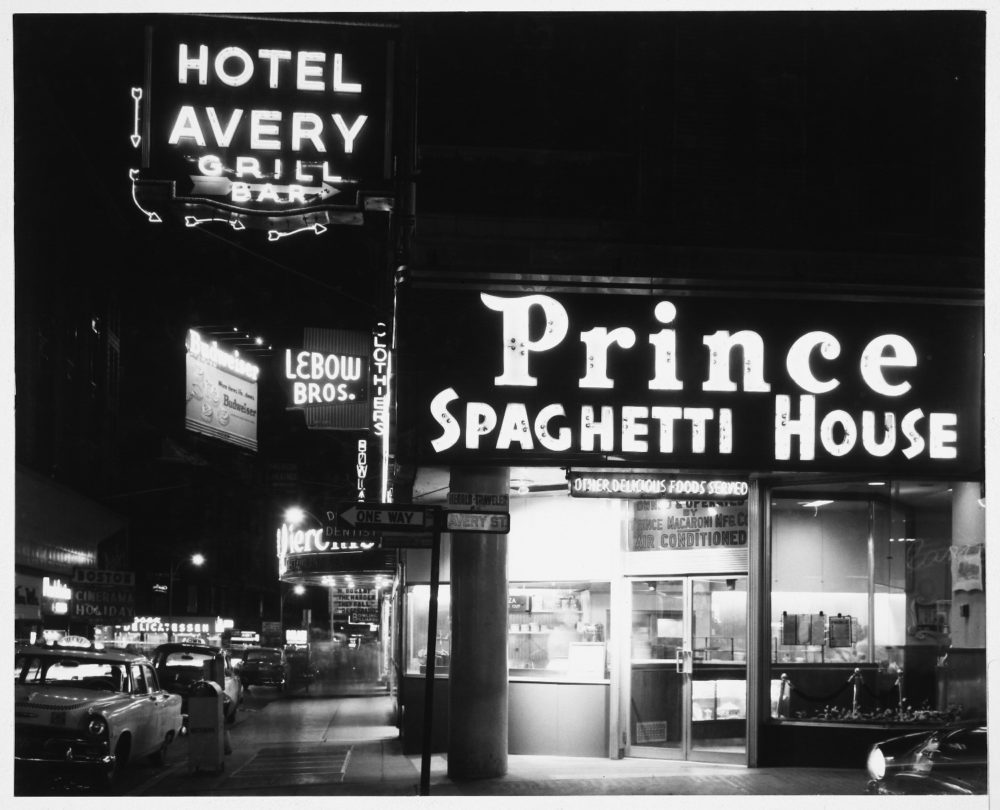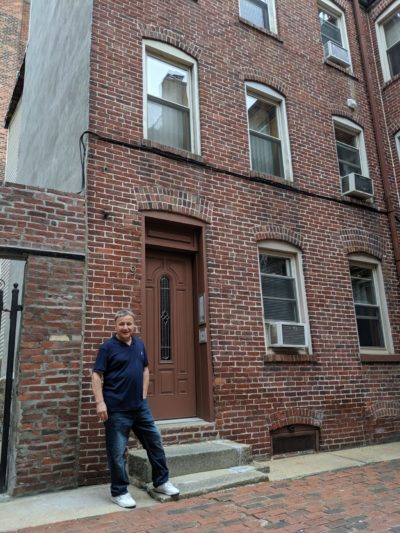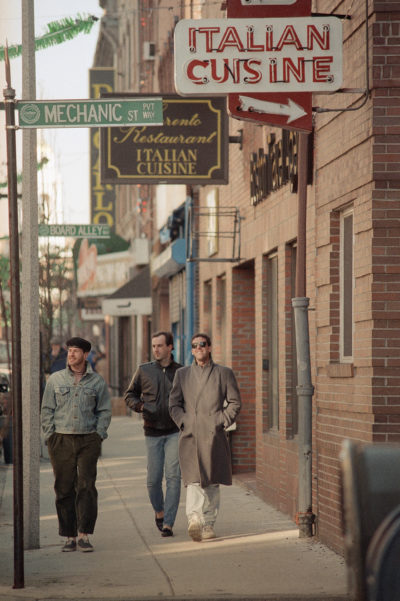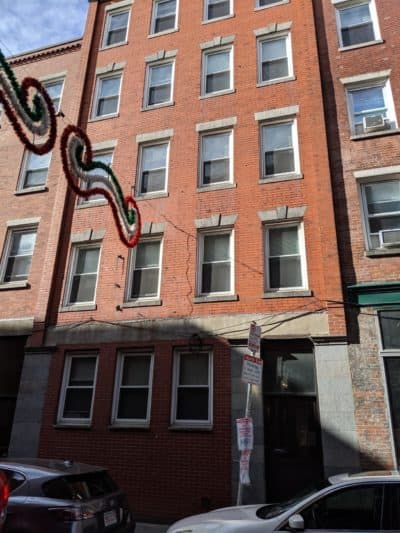Advertisement
Anthony Martignetti, The 'Anthony!' Of The Prince Spaghetti Ads, Has Died

Editor's note: The family of Anthony Martignetti confirmed his death on Monday, Aug. 24, 2020. He was 63. Read on for our October 2019 feature commemorating the 50th anniversary of the famous "Wednesday is Prince Spaghetti Day" ad.
Fifty years ago this fall, Prince Pasta began running their now-iconic "Wednesday is Prince Spaghetti Day" TV commercial.
It featured a young Anthony Martignetti running through the streets of the North End, and made him a bit of a local legend here, where he still gets recognized as "Anthony!"
"I remember getting letters, people saying they named their kids after me, Anthony," Martignetti said. "People say to me, 'My name's Anthony and people stretch it out when they say it, the same way they do it in the ad. They sing it.'"
The commercial ran on television for 13 years starting in the fall of 1969, and it was produced by the then Lowell-based Prince Pasta Company.
It opens with the late Mary Fiumara, leaning out of a second story window on Powers Court calling to her TV son, Anthony.
"The minute you say Anthony, people know what you're talking about," said Jim Botticelli, the author of the book "Dirty Old Boston: Four Decades Of A City In Transition." "If you say it in that tone of voice, 'Anthony!' people know exactly what you're talking about."
You're talking about Prince and pasta. In 1969, Italian-style pasta was not as thoroughly part of the mainstream as hot dogs and burgers. Italian food, for many Americans, consisted of cans of SpaghettiOs and Chef Boyardee.
The 1969 Prince commercial let America in on the secret of Italian family dinners.
"It's a little voyeuristic in some ways," said Paula Taylor, who runs Off The Eaten Path food and history tour of the North End. "You see Anthony running through the streets, and then it flips to being being back in the kitchen, where you see his mother making the pasta and the family gathering at the table. It's like a documentary in some ways. There's something raw about it."
Advertisement
"I remember getting letters, people saying they named their kids after me, Anthony."
Anthony Martignetti
And for folks like James Pasto, cofounder of the North End Historical Society, the commercial put Boston Italian Americans like him into the center of American life.
"It was exciting to see us on TV, which we weren't used to seeing. It was unworldly, surreal almost, because we were on the map of America," Pasto said.
The commercial ends with the family gathered at the table. And Anthony enters last.
"[The producers] said to stand outside the door and when we say, 'Action,' you come in. And they said, 'Listen, you've been running all this way, you gotta act like you're tired.' I wasn't an actor, I don't know how to act tired," Martignetti said. "One of the guys I was with made me run 15 times up and down the stairs, so when I opened that door I was really exhausted. I wasn't acting, I was tired."

If Martignetti wasn't an actor, how did a 12-year-old kid born in Italy come to star in an American TV commercial that ran for more than a decade? Turns out he was simply nice to a couple of ad men and TV producers walking around the North End.
"You could tell they didn't live around here," Martignetti said. "The way they were dressed. They had long hair. Back in those days, our parents always told us to stay away from the hippies because they're going to kidnap you."
When they asked for directions, Martignetti and his friends definitely knew they weren't from the North End.
"In those days, you knew everyone from the neighborhood," he said. "My friends were mean to them, typical punks. I just gave them directions. And a few weeks later they asked me if I wanted to be on TV."
The ad became a classic. In today's terms, it went viral, according to Peter Seronick, a former Boston ad man who teaches at Emerson College.
"It was iconic. Is it incredibly creative? No. But did it do its job? Absolutely," he said. "Fast forward 50 years, and when I walk through a supermarket and I see those boxes of Prince dried pasta, my brain triggers that slogan, 'Wednesday is Prince Spaghetti Day.' "
A lot has changed in the North End since the ad started running 1969. Back then, Boston was balkanized, and the North End was mostly Jewish and Italian immigrants. It was walled off from the rest of the city by the central artery.
"It was fishmongers, green grocers, butchers with rabbits hanging in the windows [and] chickens in the back, and lots of people hanging out in the streets," Taylor said. "The neighborhood felt more colorful, with lots of awnings on the storefronts. You don't see that as much anymore."

Martignetti is in now his 60s, works as a court officer and doesn't live in the neighborhood anymore. Lifelong North End resident Fiumara died in 2016. And Prince is no longer a local company producing pasta in New England; it's now one of dozens of brands owned by Madrid-based food conglomerate Ebro Foods.
Yet, if you stroll down Hanover or Prince streets today, you'll still get a distinctly Italian American experience, with pastry shops, markets and restaurants lining the main drag. You'll see double-parked delivery trucks unloading all kinds of Italian foods and imports.
But you'll also see a more diverse group of residents and lots of tourists. You'll see a Chinese takeout place and a Bank of America.
Pasto said the Prince commercial takes us back to an older idea of the North End, with a certain nostalgia for how it might have been when it was a stopping place of new Italian immigrants.
"It created something to look back towards, the North End of the '60s," says Pasto. "It re-created the Italian American neighborhood, in a sense."
And for J.J. Pellegrino, the grandson of the Prince Pasta chief executive who came up with the famous slogan, the ad holds a special place in his family's lore.
"It has a really nice sense of authenticity," said Pellegrino, who was also in the ad, sitting at the table, ready to enjoy the meal. "Families would gather around the table to be together and share stories, and that was a little moment in time akin to that, and I think that authenticity was what helped it be lasting, and to endure."
The Pellegrino family sold Prince in 1987, but the impact of ad endured far beyond the company.
"It made people aware of pasta," said Marguerite Buonopane, the author of six editions of "The North End Italian Cookbook."

"Pasta is a good thing, which we took for granted," she said. "There's no other food in the world better than a plate of spaghetti with sauce."
Maybe the "Wednesday is Prince Spaghetti Day" tagline and ad had something to do with the fact that Americans annually consume about 20 pounds of pasta per person, according to the National Pasta Association.
"People from Texas tell me they love that commercial," Taylor said. "It put the North End on the map as America's little Italy."
For Buonopane, now that the North End is very much on the map, it's also changed. And not just the neighborhood, but the culture.
"Those days are gone, as far as I know," Buonopane said. "It'll never be the same, unless everyone cooks and slows down."
Martignetti agrees.
"I miss those days, Sunday afternoons, my brothers, my sister — every weekend it was a family gathering," he said. "Now you're lucky if you see your family once a year. Everybody's rushing to be someplace. Relax, you know? Sit down, enjoy your family. They don't last forever."
In some ways, this is the strength of Prince ad. Yes, it's just a 50-year-old TV ad that's trying to sell a box of dried pasta, but it's also selling the idea of a family gathering around the table for dinner.
That simple idea helped change how a lot of Americans viewed Italian food, and their Italian American neighbors.
"I guess we've made that Prince Pasta ad a metaphor for the times we lived in versus the times we live in," Botticelli said.
And even though Fiumara leaned out that second story window to call "Anthony," she perhaps was really calling us all back to the table.
An image by MIT-Libraries was used for this story.
This story was edited by Hitesh Hati.
This article was originally published on October 23, 2019.
This segment aired on October 23, 2019.

